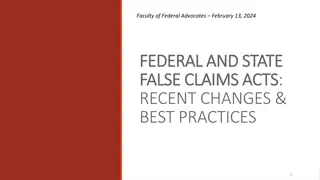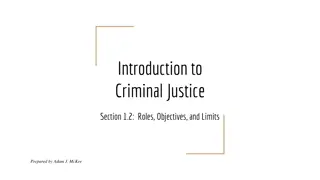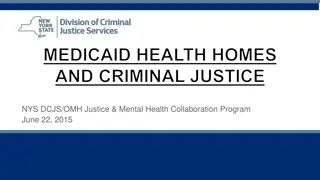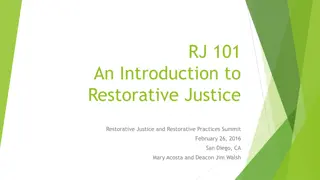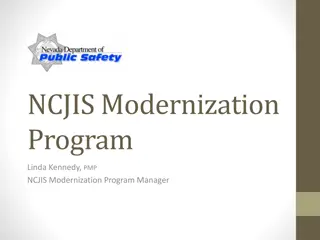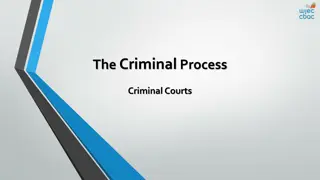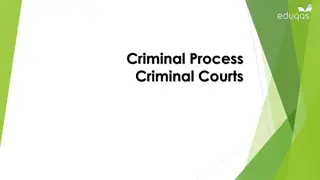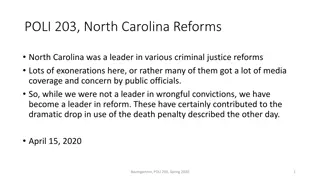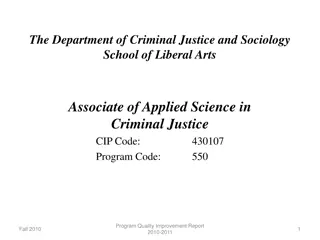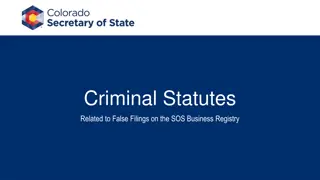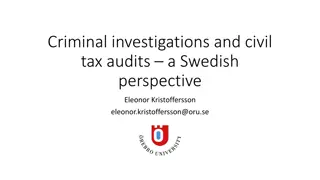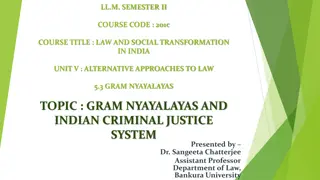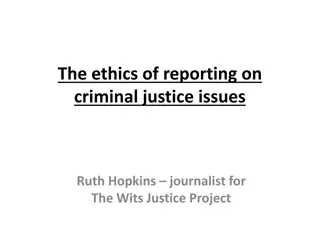Understanding False Confessions in the Criminal Justice System
False confessions are a concerning issue in the criminal justice system, leading to wrongful convictions and unjust outcomes. Various factors contribute to false confessions, including coercion, misinterpretation, and vulnerable demographics. The consequences of false confessions can be severe, impacting individuals, law enforcement, prosecutors, defense attorneys, juries, judges, and post-conviction processes.
Download Presentation

Please find below an Image/Link to download the presentation.
The content on the website is provided AS IS for your information and personal use only. It may not be sold, licensed, or shared on other websites without obtaining consent from the author. Download presentation by click this link. If you encounter any issues during the download, it is possible that the publisher has removed the file from their server.
E N D
Presentation Transcript
False Confessions James Davidson Ph.D. Dallas | Plano | Lewisville (972) 876-8180 Cell drjwdavidson@gmail.com www.jamesdavidson.net
If a person is innocent of a crime, then he is not a suspect Attorney General Edwin Meese telling the American Bar Association that the Miranda decision advising those arrested of their rights was no longer necessary. (Petras, R. (1993) The 776 Stupidest Things Ever Said
3/14/2016 The Causes of Wrongful Conviction The Innocence Project Exonerations: False Confessions 337 DNA Exonerations To Date 52 DNA Exonerations In Texas Contributing causes confirmed through Innocence Project research. Actual numbers may be higher, http://www.innocenceproject.org/causes-wrongful-conviction 1/2
Consequences of False Confessions POLICE: Close Case, Ignore Contradictory Evidence, Refuse to Admit Error PROSECUTORS: Set Higher Bail, More and Higher Charges, Make Centerpiece of State s Case DEFENSE ATTORNEYS: Presume Client s Guilt; Pressure Client to Plead Guilty; A 78-85% risk of being wrongfully convicted if the case is not dismissed prior to trial (Leo & Ofshe, 1998; Drizin & Leo, 2004). JURIES: More Likely to Convict, Even if Confession Was Coerced (Kassin & Sukel, 1997) JUDGES: Sentence Higher for Failure to Show Remorse POST-CONVICTION: Law Almost Never Permits Appeals Based on Innocence 6
Who Says I Did It - When They Didnt? The 4 I s: People at greatest risk Immature (Juveniles) Impaired (Developmentally Delayed) Imbalanced (Mentally Ill) Impressionable (Sheeple)
Six Types of False Confessions 1. Voluntary false confession Reasons: Notoriety, Protect someone, Need for punishement 2. Coerced compliant false confession 1. 1. Reasons: Solicited via interrogation tactics and desire to stop the questioning, thought of going home or perception of less punishment 3. Retracted confession 1. Reasons: Once out of interrogation setting the fact that the confession was false emerges
Six Types of False Confessions 4. Coerced internalized false confession Reasons: Attained via an impressionable subject s internalization of crime due to Reid techniques (lying about evidence witnesses etc.), and often accompanied by the subject s memory lapse due to drug or alcohol use. 5. Coerced reactive false fonfession 1. Reasons: Third party pressure to confess (i.e. gang member or abusive spouse) 6. Coerced substituted false confession 1. 1. Reasons: Subject has committed a number of similar crimes (i.e. GTA) and can t remember all of his crimes so agrees to similar crimes added by the police.
Pathways to False Confessions Misclassification Error: Police erroneously conclude the subject is guilty Interview becomes and interrogation Police believe they can detect lying better than most but research says otherwise. Police cannot reliably detect false and true confessions. Coercion Error: Police interrogate with coercive tactics Accusations of guilt, lies about evidence, sleep deprivation, lengthy interrogations, allusions to going home tonight , empathy. Contamination Error: Police contaminate the subject s story or false confession Shape the narrative with leading questions, playing on a subject s memory, showing crime scene photos or giving details, fabrication
The Reid Technique Pathway to False Confessions What is the Reid Technique: 9 Step Method for interview and interrogation taught to thousands of police departments The prevalence of the Reid Technique (and variations) Minimization techniques: Soft sell tactics that provide a sense of false security (e.g., justifying the crime) Maximization techniques: Scare tactics that attempt to intimidate suspects (e.g., making up evidence) The difference between interview and interrogation Information versus accusation
The Reid Technique Pathway to False Confessions Police interrogation tactics Police can lie to a suspect (we have your prints, your hair, a witness identified you, etc) Police can accuse a suspect of a crime Police can use tactics that promote confusion that lead to false confessions, such as attacking the suspect s alibi, or interrupting the suspect s denials Police can manipulate by suggesting face saving alternatives or justification while noting do what s right or we all just want to go home tonight.
When Do False Confessions Occur? Without representation (Miranda waiver AND waiver failure, i.e. not voluntary, knowing and intelligent) After lengthy questioning (exhaustion) After abusive questioning (coercion) After an interrogator prepares a false statement After an interrogator becomes convinced that the subject did it (confirmatory bias) Grisso (1980) Juvenile s capacity to waive Miranda rights
When To Call An Expert Major felony Vulnerable defendant Evidence of flawed Miranda waiver or interrogation Sooner than later Adequate funding Adequate records (Audio/video OR amazing lack of records) Court Order
The Experts Task Identify the referral question Review multiple sources of information Interview the defendant Convey a verbal report Prepare a written Psychological Evaluation Testify
The Experts Task: Three Main Referral Questions Miranda Waiver: Did the State fail to prove, by a preponderance of the evidence, that the defendant knowingly, intelligently, and voluntarily waiver their Miranda rights? Voluntary Confession: Did the State fail to prove, by a preponderance of the evidence, that the defendant s confession was freely and voluntarily made under the totality of the circumstances? Knowing and Intelligent Confession: Should the Court suppress the defendant s statements to the police because the statements are highly unreliable and virtually uncorroborated due to coercion or other factors?
Pathways to Asking the Referral Question (AKA The Smell Test) Was The Subject a Vulnerable Person? Immature, Impaired, Imbalanced, Impressionable Does the subject voluntarily show, without prompting, culpability? Were Interrogation Techniques Likely to Prompt a False Confession? Deception Coercion Leading questions Suggesting withheld facts to shape the subject s statements Lengthy interrogations(more than 2 hours) Not recorded or poorly recorded/documented Police preparing the post interrogation admission/confession statement for the subject Etc.
The Experts Task: Review Multiple Sources of Info What was the setting? The room, people present, time temperature and length of interrogation, provision of food, etc. What takes place on the record (audio, video or written)? Can everyone be clearly understood? How was the interrogation conducted? Were interrogation techniques used that could prompt a false confession? Was there evidence of the defendant s culpability? What is contained in police reports, 911 calls, health records etc.? Background information on the defendant.
The Experts Task: Interview the Defendant Is The defendant a Vulnerable Person? Does the defendant voluntarily show, without prompting, culpability? What are the defendant s strengths and weaknesses? What was the defendant s mental and physical state at the time of the Miranda warning and waiver, during the interrogation and upon confessing? What are the results of a Psychological Evaluation, i.e. clinical interview and testing? What does the defendant say about their confession?
The Experts Task: Convey a Verbal Report The verbal report briefly summarizes the findings, and provides enough information for the ADA to determine whether or not they should proceed with challenging the Miranda waiver and/or confession.
The Experts Task: Prepare a Written Psychological Evaluation The psychological report would present, in defensible detail, the following: Referral question Notification, limitations, procedures and data sources History Prior Psychological Evaluations Forensic Interview Forensic Assessment of Understanding (Miranda or Confession) Forensic Assessment of Malingering Discussion and Conclusions
The Experts Task: Testify Some psychologists, by virtue of their knowledge, training and experience, are able to assist the Court in each of the following areas: Assess the physical and psychological environment in which the [waiver] was obtained (Crane v. Kentucky, 1986, p. 684). Evaluate the defendant s mental status, including psychopathology, intelligence, memory, and comprehension. Reconstruct the defendant s mental state at the time of the waiver and/or confession (similar to MSO/NGRI report) Assist the Court in understanding the intersection of these factors.
Resources The Innocence Project The Innocence Project of Texas http://www.ipoftexas.org/ National Registry of Exonerations http://www.law.umich.edu/special/exoneration/Pages/about.aspx Conviction Integrity Unit Dallas County District Attorney https://www.dallascounty.org/department/da/conviction_integrity. php DeClue, G. (2005) Interrogations and disputed confessions. Sarasota FL: Processional Resource Press. Drizin, S. & Leo, R. (2005) THE PROBLEM OF FALSE CONFESSIONS IN THE POST-DNA WORLD.
Resources Inbau, F. E. et al. (2011) Criminal interrogations and confessions. Burlington, MA: Jones & Bartlett Learning Kassin, S. et al (2010) Police-Induced Confessions: Risk Factors and Recommendations. Law & Human Behavior 34: 3-38. Lassiter, G. & Meissner, Chuck . (2010) Police interrogations and false confessions: Current research, practice and policy recommendations. Washington DC: American Psychological Association. Redlich, A. & Meissner, C. (2016) Techniques and Controversies in the Interrogation of Suspects: The Artful Practice versus the Scientific Study. In press.



